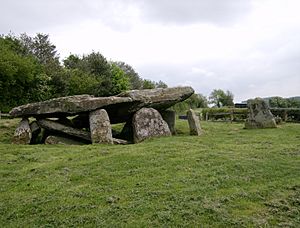Arthur's Stone, Herefordshire facts for kids
Quick facts for kids Arthur's Stone |
|
|---|---|

Arthur's Stone
|
|
| Location | Herefordshire, England, UK |
| OS grid reference | SO318430 |
| Lua error in Module:Location_map at line 420: attempt to index field 'wikibase' (a nil value). | |
Arthur's Stone in Herefordshire is a very old stone tomb. It's called a Neolithic chambered tomb or Dolmen. People built it a long, long time ago, between 3,700 BC and 2,700 BC. This means it's over 4,700 years old! It sits on top of a hill, looking over the beautiful Golden Valley and the Wye Valley in England.
Contents
Where is Arthur's Stone?
Arthur's Stone is found between two small villages, Dorstone and Bredwardine. It's also located between the city of Hereford to the east and the town of Hay-on-Wye to the west.
From the stone, you can see amazing views. To the south, you'll see the Golden Valley and the Brecon Beacons mountains far away. A small road, called Arthur's Stone Lane, runs along the north side of the site. This road actually cuts through where the long mound of the tomb used to be.
What Does Arthur's Stone Look Like?
The Giant Capstone
The most noticeable part of Arthur's Stone is its huge top stone, called a capstone. This capstone is super heavy, weighing more than 25 tonnes! That's like the weight of about five elephants! It rests on nine tall stones that stand upright. There's also a curved entrance passage that is about 4.6 meters (15 feet) long.
The Quoit Stone
Years ago, there was a special stone to the north of the tomb called the Quoit Stone. It had small cup-shaped marks on it. You can't see these marks clearly anymore. Now, a different stone to the south of the monument is known as the Quoit Stone.
How the Tomb Used to Look
Originally, all these stones were covered by a large mound of earth. This mound was about 25 meters (82 feet) long and stretched from north to south. It had an entrance facing east and a "false door" facing south. Today, most of this earth mound has worn away. The big capstone is also broken, with a large piece fallen from underneath it.
Protecting the Site
A wooden fence now surrounds Arthur's Stone to help protect this ancient monument. It is considered a special example of the Severn-Cotswold tomb Group of stone tombs, which are mostly found further south. It's one of five similar ancient tombs in this local area.
What's the Story Behind the Name?
Arthur's Stone is one of many old places in western England and Wales that are connected to the famous stories of King Arthur.
Some legends say the tomb was built to mark where one of King Arthur's battles happened. Other stories tell that the stones were already there when Arthur fought and defeated a giant on that very spot. They say the giant fell onto the stones, leaving dents that you can still see today. Another tale suggests the marks on the Quoit Stone were made by King Arthur's knees or elbows when he knelt there to pray.
A Look at Its History
Arthur's Stone has seen many things over the centuries:
- During the Wars of the Roses, a knight named Turberville was killed in a fight here by another knight, Thomas ap Griffith.
- On September 17, 1645, King Charles I gathered his army at the stone. He even ate a meal there before spending the night at a place called Holme Lacy.
- Until the mid-1800s, people used to have celebrations with dancing at the stone. A Baptist church service was also held there every year on the fourth Sunday in July.
- The famous writer C.S. Lewis, who wrote the Narnia books, was inspired by the Golden Valley and the Wye Valley. It's said that the stone table where Aslan the Lion is sacrificed in his stories was based on Arthur's Stone.
See also
 In Spanish: Piedra de Arturo para niños
In Spanish: Piedra de Arturo para niños
 | Jewel Prestage |
 | Ella Baker |
 | Fannie Lou Hamer |

